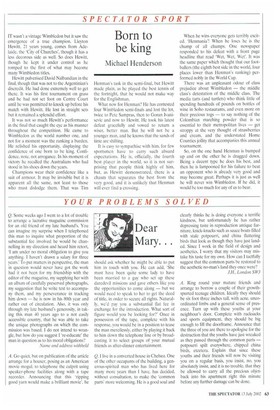Born to be king
Michael Henderson
IT wasn't a vintage Wimbledon but it saw the emergence of a true champion. Lleyton Hewitt, 21 years young, comes from Adelaide, the 'City of Churches', though it has a less decorous side as well. So does Hewitt, though he kept it under control as he romped to the first of what may become many Wimbledon titles.
Hewitt pulverised David Nalbandian in the final, though that was not to the Argentinian's discredit, He had done extremely well to get there. It was his first tournament on grass and he had not set foot on Centre Court until he was permitted to knock up before his match with Hewitt, He lost in straight sets but it remained a splendid effort.
It was not so much Hewitt's performance in the final that caught the eye as his manner throughout the competition. He came to Wimbledon as the world number one, and not for a moment was the ranking a burden. He relished his opportunity, displaying the confidence of one born to be king. Confidence, note, not arrogance, In his moment of victory he recalled the Australians who had stood in his shoes down the years.
Champions wear their confidence like a suit of armour. It may be invisible but it is apparent all the same, not least to those who must dislodge them. That was Tim Henman's task in the semi-final, but Hewitt made plain, as he played the best tennis of the fortnight, that he would not make way for the Englishman.
What now for Henman? He has contested four Wimbledon semi-finals and lost the lot, twice to Pete Sampras, then to Goran Ivanisevic and now to Hewitt. He took his latest defeat gracefully and vowed to return a wiser, better man. But he will not be a younger man, and he knows that the sands of time are shifting.
It is easy to sympathise with him, for few sportsmen have to carry such absurd expectations. He is, officially, the fourth best player in the world, so it is not surprising that people think highly of him, but, as Hewitt demonstrated, there is a chasm that separates the best from the very good, and it is unlikely that Henman will ever find a crossing. When he wins everyone gets terribly excited. 'Henmanie When he loses he is the chump of all chumps. One newspaper responded to his defeat with a front page headline that read 'Wet. Wet, Wet'. It was the same paper which thought that our footballers (the eighth best side in the world, four places lower than Hertman's ranking) performed nobly in the World Cup.
There was an unpleasant odour of class prejudice about Wimbledon — the middle class's detestation of the middle class. The media tarts (and tartlets) who think little of spending hundreds of pounds on bottles of wine in Soho restaurants, and even more on their precious togs — to say nothing of the Colombian marching powder that is so essential to their metropolitan lives — get stroppy at the very thought of strawberries and cream, and the understated Home Counties jollity that accompanies this annual tournament.
So, on the one hand Henman is bumped up and on the other he is dragged down. Being a decent type he does his best, and then he is lampooned for his failure to beat an opponent who is already very good and may become great. Perhaps it is just as well he will never win Wimbledon. If he did, it would be too much for any of us to bear.


































































 Previous page
Previous page